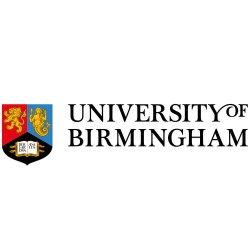University of Birmingham, United Kingdom
One of the top research-intensive universities in the UK was founded in 1900 and is called the University of Birmingham. Located in Edgbaston, Birmingham, the university has a long history of academic success and a lively, modern atmosphere. Recognized worldwide for its dedication to creativity, sustainability, and diversity, the University of Birmingham offers a life-changing educational experience that gives students the tools they need to live in a world that is becoming more interconnected by the day.
The first English civic or "red brick" university to be granted a royal charter is the University of Birmingham, a public research university located in Birmingham, UK. It is also the first English unitary university. With 24,885 undergraduate students and 13,825 graduate students, the institution is the tenth largest in the United Kingdom and a founding member of both the Russell Group of British research universities and the worldwide organization Universitas 21. The Joseph Chamberlain Memorial Clock Tower, the Shakespeare Institute, the Barber Institute of Fine Arts, and the Cadbury Research Library are all located on campus.
With its spacious campus, modern amenities, and vibrant student body, the university symbolizes the ideal fusion of culture and innovation. It is a global powerhouse whose research projects address some of the most important problems in the world, including health disparities, climate change, and technological developments.
From a Humanitarian Aspect
The University of Birmingham’s humanitarian focus is proof in its commitment to creating a positive impact through education and research. Programs addressing climate change, public health, and global inequalities align with the United Nation Sustainable Development Goals.
In order to develop a sense of social responsibility, students are encouraged to volunteer and participate in community service. Projects such as the Birmingham Project and community collaborations enable students to handle practical issues, ranging from social justice activism to urban revitalization.
The University of Birmingham continues to be a welcoming school that nurtures talent and promotes equality and creativity through its wide range of courses, reasonably accommodation for the students to reside. Its prospects for 2025 is to strengthen its position as a leading opportunity for students hoping to have a significant influence of their disciplines.
University of Birmingham Programs & Fees
Countless undergraduate, graduate, and doctorate programs in a variety of fields are available at the University of Birmingham. Important faculties consist of:
Degrees in history, literature, philosophy, and other subjects are offered by the arts and humanities, along with chances for creative writing and cultural studies.
Social Sciences: Courses that blend theoretical depth with real-world application in the fields of economics, sociology, political science, and law.
Civil engineering, computer science, physics, and advanced research in artificial intelligence and renewable energy are all included in the engineering and physical sciences.
Medical and Life Sciences: Public health, biosciences, dentistry, and medicine courses. The medical school is well known for its innovative contributions to the field of healthcare.
Business: The Birmingham Business School, a world wide renowned university, offers degrees like MBA, international business, and finance. In seeking career advancement.
The university's wide-ranging programs, which surpass traditional academic boundaries, are especially widely recognized. Students are increasingly enrolling in courses that combine ethics with artificial intelligence or sustainability and urban planning, for example. Other options for managerial training and distance learning are available to working individuals who want to make headway in their careers.
University of Birmingham Fees
The tuition fees at the University of Birmingham vary depending on the program and level of study:
Undergraduate Programs: £19,740 - £24,600 per year for international students.
Postgraduate Taught Programs: £20,000 - £28,000 annually for international students.
MBA: £30,450.
Additional expenses, which range from £12,000 to £15,000 per year, may include living expenses, study materials, and housing. The institution offers scholarships and allowance to qualified students in order to reduce their financial burden. Additionally, students can manage their finances and do useful work experience by taking advantage of part-time jobs both on and off campus.
Cost of living in United Kingdom
Students can choose from a variety of on-campus and off-campus housing options at the University of Birmingham:
On-campus lodging options start at £5,100 per year and include shared apartments and en suite rooms. Wifi, laundry facilities, and 24 hours security are among with the amenities.
Off-Campus Accommodations: In the nearby settlements of Selly Oak and Harborne, private rentals are available for an average annual cost of £8,000. For students who want more independence, then these choices are perfect. Special accommodations are available for the students who are with families, have disabilities, or some religious needs. The university’s housing support team assists students in finding suitable options and settling into their new homes.
University of Birmingham Rankings
The University of Birmingham consistently ranks among the top universities globally and nationally:
UK Rankings: It is positioned within the top 15 universities in the UK across major league tables
Global Rankings: Due to its strong academic reputation and research output, Birmingham is ranked among the top 100 institutions in the world by the QS World University Rankings 2025.
Significant factors influencing these rankings include the university's employment results, student satisfaction ratings, and research quality. Its renown is further strengthened by its impressive achievement in specialized fields including public health, education, and engineering.
University of Birmingham's Global Ranking
By the year 2025, the University of Birmingham has established itself as one of the top universities globally. It is ranked in the top 100 QS World University Rankings and is particularly strong in the following areas:
Mainly the environmental sciences' contributions to sustainability and climate research.
Known for its global collaborations and realistic approach, Business & Management Studies is ranked in the top 75 worldwide.
Dentistry and Medicine (Top 60 worldwide): A exemplification to its state-of-the-art research and first-rate medical education. By providing international internships, collaborative research initiatives, and student exchanges, these alliance enhance the educational process.
University of Birmingham Acceptance Rate
The University of Birmingham offers international students a competitive acceptance rate of about 14%.
Specific Course prerequisites for admission usually include:
Excellent academic performance: A solid academic record in relevant fields.
The university's remarkable reputation is a result of its key crucial partnerships with organizations in Asia, Europe, and North America.
English language proficiency: IELTS scores between 6.0 and 7.5 or TOEFL scores ranging from 80 to 100.
Strong supporting documents: Well-drafted letter of recommendation, personal statements, and CV.
The university adopts a holistic approach to admissions, giving more importance to extracurricular achievements and leadership qualities along with academic excellence. This guarantees that applicants who are dedicated to their work are given preference.
Scholarships
The University of Birmingham provides a number of scholarships to help international students, such as:
The £2,000 Global Masters Scholarship is awarded to international students from certain countries who are studying a taught Masters degree
High-achieving undergraduate students can receive up to £5,000 through the Birmingham Undergraduate Excellence Scholarship.
Students from Commonwealth nations can apply for Commonwealth Scholarships, which cover both living expenses and tuition fees.
Specific Awards: Scholarships that promote success in STEM, the arts, and social science programs.
Students are advised to look into outside financing sources like Great Scholarships for international students and Chevening Scholarships. Advice on eligibility requirements and application procedures is available on the website of the university.
University of Birmingham Placements
In the six months following graduation, the University of Birmingham boosts an outstanding 90% employment rate. Among its career help offerings are:
It provides Opportunities for work placements and internships with renowned companies such as AstraZeneca, Deloitte, and PwC.
Career Guidance: Individualized counseling with the counselor, training before joining the job will be given, and counselors will guide you about the interview techniques.
Resources for students interested in launching their own companies or volunteer work are given by Enterprise Support. Through its collaborations with both local and international companies, the universities guarantee that students acquire useful experience and skills. Professional development and networking opportunities are also offered by employment fairs and alumni networks.
University of Birmingham Visa
The University of Birmingham requires international students who wish to study there to apply for a Student Visa. Some basic requirements are:
An academic institution's Confirmation of Acceptance for Studies (CAS).
Confirmation of the ability to pay for living expenses and tuition.
Proof of fluency in the English language, like IELTS, PTE, OET or TOEFL results.
Applying for a visa can take three to eight weeks. When students arrive, the university's International Student Team helps them with immigration questions, cultural adjustment, and adapting to adapt the changes in the UK. For international students, workshops and events for orientation help them for a smooth transfer.
University of Birmingham intake
There are two main intakes at the University of Birmingham:
September Intake: The overwhelming majority of undergraduate and graduate courses start in September.
January Intake: There are not so many postgraduate options, especially in engineering and business.
Applicants are advised/suggested to start the application process early to secure a place, as some programs seats fill’s quickly. Deadlines vary, but early submission is recommended. The university’s admissions team is available to assist interested students throughout the application process.









